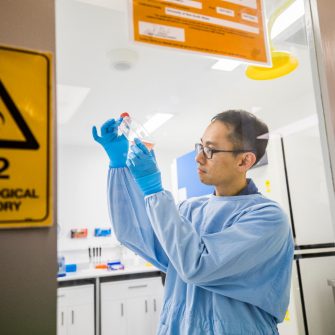Graduate Diploma in Engineering Science
- Commencing Terms
- Term 1, 2 & 3
- Duration
- 1.7 years F/T, 3.3 Years P/T
- Delivery Mode
- Face-to-face (includes blended)
- Campus
-
Kensington
- Codes
- Program code 5373
- CRICOS code 113779J
-
2026 Indicative first year full fee
- $45,000*
-
2026 Indicative full fee to complete degree
- $68,500*
-
2026 Indicative first year full fee
- $61,000*
-
2026 Indicative full fee to complete degree
- $94,500*

Application closures for 2026
International applications for all undergraduate programs, as well as postgraduate programs offered by the faculties of Arts, Design & Architecture, Engineering (excluding Master of Information Technology and associated programs) and Science are now closed to New Overseas Student Commencement (NOSC) for 2026 intakes.
Postgraduate programs offered by the Business School and the faculties of Law & Justice and Medicine & Health remain open. Master of Information Technology (and associated programs) also remain open.
- Overview
- Entry requirements
- What will I study?
- Future careers
- How to apply
- Fees & Scholarships
Overview
If you're an engineer or a graduate wanting to further develop and expand your knowledge in a specialised area, the Graduate Diploma of Engineering Science is for you. This program will enable you to meet or maintain professional accreditation standards, provide opportunities for continuing professional development and interact with those at the cutting edge of their discipline. You'll add breadth to your knowledge of engineering in general and expand your skills in engineering management, as well as developing your technical knowledge and ability to analyse engineering problems.
The specialisations available include:
Biomedical Engineering; Chemical Engineering; Civil Engineering; Transport Engineering; Environmental Engineering; Project Management; Water Engineering: Catchments to Coast; Water, Wastewater and Waste Engineering; Geospatial Engineering; Geotechnical Engineering and Engineering Geology; Geoenergy & Geostorage Engineering; Structural Engineering; Electrical Engineering; Energy Systems; Food Process Engineering; Manufacturing Engineering and Management; Mechanical Engineering; Nuclear Engineering; Petroleum Engineering: Petroleum Engineering Open Learning; Photovoltaics and Solar Energy; Renewable Energy; Telecommunications; Systems and Control; Space Systems Engineering; Sustainable Systems; and Robotics. This program also serves as a pathway towards the Master of Engineering Science.
Why study at UNSW?
UNSW Engineering is a leader in engineering education and research. We're ranked #1 in Australia and #25 globally for Engineering and Technology. All eight of UNSW's Engineering schools are ranked in the global top 50 with two schools ranked in the global top 10 for Engineering subjects (QS World University Rankings by Subject, 2025).
Further rankings from QS World University Rankings by Subject, 2025:
- Ranked #1 in Australia for Civil and Structural Engineering
- Ranked #1 in Australia for Electrical Engineering
- Ranked #1 in Australia for Mechanical, Aeronautical and Manufacturing Engineering
- Ranked #1 in Australia and #2 globally for Mineral and Mining Engineering
- Ranked #2 in Australia for Chemical Engineering
- Ranked #2 in Australia and =#10 globally for Petroleum Engineering
- Ranked #4 in Australia for Computer Science
UNSW is known for its graduate employability, with UNSW awarded the Most Employable students for seven years in a row (Australian Financial Review (AFR) Top100 Future Leaders Awards, 2020–2026).
The Graduate Diploma of Engineering Science allows you to develop your technical knowledge and skills in an existing engineering specialisation.
Who should choose this graduate diploma?
Engineers and graduates choose this program to advance and broaden their skills, and to progress to the Master of Engineering Science.
Want to see more from UNSW Engineering?
Entry requirements
Admissions to the standard 1.7 year program requires the following:
- A bachelor's degree or AQF Level 7 equivalent in a cognate discipline with a minimum 65% average.
You can view a list of cognate disciplines here.
Recognition of Prior Learning (Credit Transfer)
Recognition of Prior Learning is the transfer of credit towards your program from previous study. If you have relevant previous study experience, you may be eligible for credit points that would enable you to complete your Graduate Diploma of Engineering Science in as little as one year, or another accelerated option listed below dependent on your previous study.
-
Admissions to the standard 1.7 year program requires the following:
- A minimum AQF Level 7 undergraduate qualification per the Australian Qualifications Framework in a cognate discipline with a minimum 65% average.
-
Admissions to the 1 year program requires the following:
- A bachelor's degree or AQF Level 7 equivalent from any institution in a cognate discipline.
English language requirements
You may be asked to provide evidence of your English proficiency to study at UNSW depending on your educational background and citizenship. English language skills are vitally important for coping with lectures, tutorials, assignments and examinations - this is why UNSW requires a minimum English language competency for enrolment.
If you’re completing an Australian Year 12 qualification (e.g. NSW HSC or equivalent), you do not need to provide anything extra to prove your proficiency. Your qualification will be used as evidence of your English proficiency.
If you do need to provide evidence of your English proficiency, this will be indicated in your application. You can prove this by providing evidence that you meet one or more of the following criteria:
- English language tests and university English courses
- Prior study in the medium of English
- Other qualifications
If you need to improve your English skills before you start your degree, UNSW College’s Academic English Programs are for you. The programs are suitable for various English levels and help you prepare for university studies and life in Australia.
For more details, visit the English Language Requirements page.
Recognition of Prior Learning (Credit Transfer)
Recognition of Prior Learning is the transfer of credit towards your program from previous study. If you have relevant previous study experience, you may be eligible for credit points that would enable you to complete your Graduate Diploma of Engineering Science in as little as one year, or another accelerated option listed below dependent on your previous study.
-
Admissions to the standard 1.7 year program requires the following:
- A minimum AQF Level 7 undergraduate qualification per the Australian Qualifications Framework in a cognate discipline with a minimum 65% average.
-
Admissions to the 1 year program requires the following:
- A bachelor's degree or AQF Level 7 equivalent from any institution in a cognate discipline.
English language requirements
You may be asked to provide evidence of your English proficiency to study at UNSW depending on whether you are from an English-speaking background or non-English speaking background. English language skills are vitally important for coping with lectures, tutorials, assignments and examinations - this is why UNSW requires a minimum English language competency for enrolment.
If English is not your first language, you’ll need to provide proof of your English proficiency before you can be given an offer to study at UNSW. You can do this by providing evidence that you meet one or more of the following criteria:
- English language tests and university English courses
- Prior study in the medium of English
- Other qualifications
If you need to improve your English skills before you start your degree, UNSW College’s Academic English Programs are for you. The programs are suitable for various English levels and help you prepare for university studies and life in Australia.
For more details, visit the English Language Requirements page.
Check the specific English language requirements for this program
What will I study?
UNSW is introducing a new academic calendar from 2028.
We are moving to a new flex-semester calendar. What does this mean for your studies?
Program structure
Add breadth to your knowledge of engineering in general and expand your knowledge and skills in engineering management in this degree. Develop technical knowledge and ability to analyse engineering problems. You'll also gain further skills in solving engineering problems and justifying professional decisions.
Choose from over 20 specialisations including:
- Biomedical Engineering
- Chemical Engineering
- Civil Engineering
- Environmental Engineering
- Geoenergy & Geostorage Engineering
- Project Management
- Water Engineering: Catchments to Coast
- Electrical Engineering
- Energy Systems
- Space Systems Engineering
- Nuclear Engineering
- Robotics
- Renewable Energy Engineering
- Telecommunications
Future careers
Potential careers
- Chemical engineer
- Chemical Product engineer
- Civil engineer
- Electrical engineer
- Project manager
- Water engineer
- Process engineer
- Structural engineer
- Environmental engineer
- Biomedical engineer
- Transport engineer
- Petroleum engineer
How to apply
Applications must be submitted through our Apply Online portal. We encourage you to submit your completed application as early as possible to ensure it will be processed in time for your preferred term. Some high-demand programs and Faculties with limited places may have an earlier application deadline or commencement date. Find out more.
Ready to start your application?
For most international students, applications are submitted via our Apply Online service. We encourage you to submit your completed application as early as possible to ensure it will be processed in time for your preferred term.
Some high-demand programs with limited places, may have an earlier application deadline or may have an earlier commencement date. For details, visit the international admissions information page.
Ready to start your application?
Fees & Scholarships
*The indicative Commonwealth Supported Place (CSP) fees are an estimate based on the relevant student contribution band/s for a Commonwealth Supported Place undertaking a standard full-time load of 48 units of credit per year (1 Equivalent Full Time Student Load/1 EFTSL). To find out more about Commonwealth Supported Places visit Postgraduate Commonwealth Support.
Indicative fees are a guide only and have been calculated based on the typical enrolment patterns of students undertaking the degree/program. The indicative fee listed here is an estimate for tuition only and excludes non-tuition fees and charges. The amount you pay will vary depending on the calendar year of enrolment, the courses you select and whether your study load is more or less than 1 Equivalent Full Time Student Load (48 units of credit (UOC) per year).
You should not rely on indicative fees as fee increases are assessed when required and may exceed the indicative figures listed here. Actual fees are calculated on enrolment. More information on fees can be found at the UNSW fees website.
*Fees are subject to annual review by the University and may increase annually, with the new fees effective from the start of each calendar year. The indicative fees listed here are based on an estimated average and are for tuition only, other fees and charges are not included. The amount you pay will vary depending on the calendar year to enrol, the courses you select and whether your study load is more or less than 1 Equivalent Full Time Student Load (8 courses per year).
Indicative fees are a guide for comparison only based on current conditions and available data. You should not rely on indicative fees. More information on fees can be found at the UNSW fees website.
Indicative fees to complete the program have been calculated based on a percentage increase for every year of the program. Fee increases are assessed annually and may exceed the indicative figures listed here.
Indicative fees to complete the program include tuition plus an estimate of study-related costs of approximately $1,000 per year. To find out more about other costs, visit UNSW International.
Scholarships
At UNSW, we award over $83 million in scholarships each year. We pride ourselves on rewarding excellence and making university accessible to students from all walks of life. Whether you’re a domestic or international student, our range of scholarships, prizes and awards can support your journey.
Progress starts here – at a world-leading university

Top 20 Worldwide
UNSW is ranked #20 university in the world
QS World University Rankings, 2024–2026

Most Employable Graduates
Winner of the AFR Most Employable University Award seven years in a row
AFR Top100 Future Leaders Awards, 2020–2026

Australia's #1 for Innovation
Highest number of startups and spinouts from university-developed tech
SCOPR report, 2024




